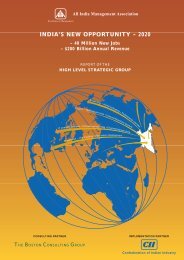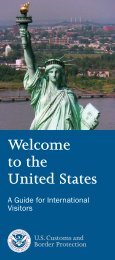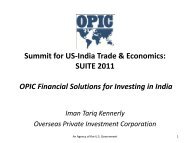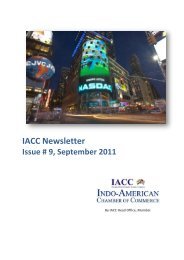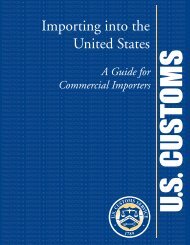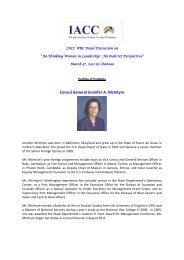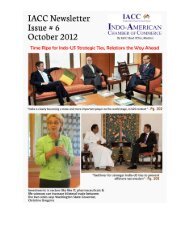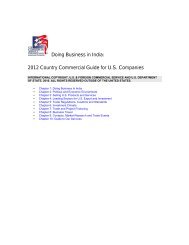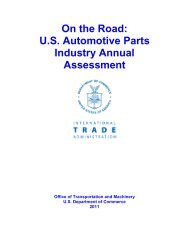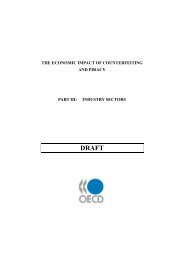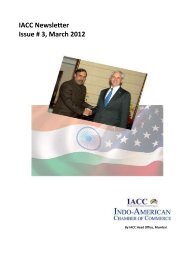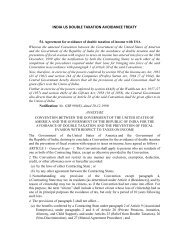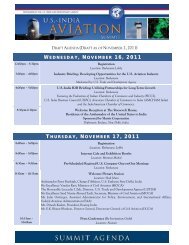Download the PDF version here - Indo-American Chamber Of ...
Download the PDF version here - Indo-American Chamber Of ...
Download the PDF version here - Indo-American Chamber Of ...
Create successful ePaper yourself
Turn your PDF publications into a flip-book with our unique Google optimized e-Paper software.
India is seen as an economic competitor to <strong>the</strong> United States. Members of <strong>the</strong> U.S. Congress routinely<br />
point to <strong>the</strong> number of high-tech graduates being produced by China and India to sound warnings that<br />
<strong>the</strong> U.S. risks losing its technical leadership unless more <strong>American</strong> students pursue math, science and<br />
engineering careers.<br />
However, <strong>the</strong> reality is higher education is India is uneven, as Indian officials have stressed to <strong>the</strong>ir U.S.<br />
counterparts.<br />
Apart from a few elite institutions, <strong>the</strong> vast majority of colleges and universities churn out graduates<br />
who lack <strong>the</strong> sought-after skills of problem solving and abstract analysis, according to a recent World<br />
Bank survey of Indian employers. The skills that <strong>the</strong> graduates possess in abundance - <strong>the</strong> ability to<br />
memorize facts and figures - is less valuable than <strong>the</strong> higher-order skills in today's global workplace,<br />
World Bank economist Andreas Blom told attendees at <strong>the</strong> Penn State conference.<br />
It is to develop a higher-education system that will produce graduates equipped with higher-order skills<br />
that <strong>the</strong> Indian government is turning to <strong>the</strong> U.S. for help.<br />
Click <strong>here</strong> for index<br />
US firms finding ways to move ahead on civil nuclear deal with India<br />
<strong>American</strong> companies are now finding ways to move ahead on commercial negotiations with India on<br />
<strong>the</strong> civilian nuclear deal, a top Obama Administration official said on Wednesday.<br />
"On <strong>the</strong> civil nuclear deal, we are pleased US companies are finding ways to move ahead with<br />
commercial negotiations," Assistant Secretary of State for South and Central Asia Robert Blake<br />
lawmakers at a Congressional hearing.<br />
Blake's remarks in his testimony before House Committee on Foreign Affairs Sub Committee on <strong>the</strong><br />
Middle East and South Asia came immediately after a key <strong>American</strong> Congressman raised concerns over<br />
<strong>the</strong> non-implementation of <strong>the</strong> civil nuclear deal. The historic civil nuclear deal has not been<br />
implemented, said Congressman Steve Chabot, Chairman of <strong>the</strong> Sub-Committee.<br />
"To date <strong>the</strong> US-India Civil Nuclear Agreement hasn't met <strong>the</strong> US commercial expectations due to <strong>the</strong><br />
nuclear liability law passed by <strong>the</strong> Indian Parliament which essentially shuts-out US companies," he<br />
said.<br />
Click <strong>here</strong> for index<br />
U.S wants India to lift import ban on dairy products<br />
The US has sought to impress upon India to lift <strong>the</strong> ban on <strong>American</strong> poultry products, arguing that <strong>the</strong>y<br />
do not pose a human health risk as is being asserted by India.<br />
“The United States maintains that <strong>the</strong> presence of Para tuberculosis in dairy products does not pose a<br />
human health risk, and India should not make elimination of this bacterium a condition for issuing a<br />
sanitary export certificate for US dairy products,” <strong>the</strong> US Trade Representatives (USTR) has said in a<br />
report.<br />
Since 2003, it said, India has imposed unwarranted SPS (Sanitary and Phytosanitary) requirements on<br />
dairy imports, which have essentially precluded US access to India’s dairy market, one of <strong>the</strong> largest in<br />
<strong>the</strong> world.For example, India requires <strong>the</strong> US Government to certify that any US-origin milk destined for<br />
India has been treated to ensure <strong>the</strong> destruction of Para tuberculosis, which according to India, is linked<br />
to Crohn’s Disease.



